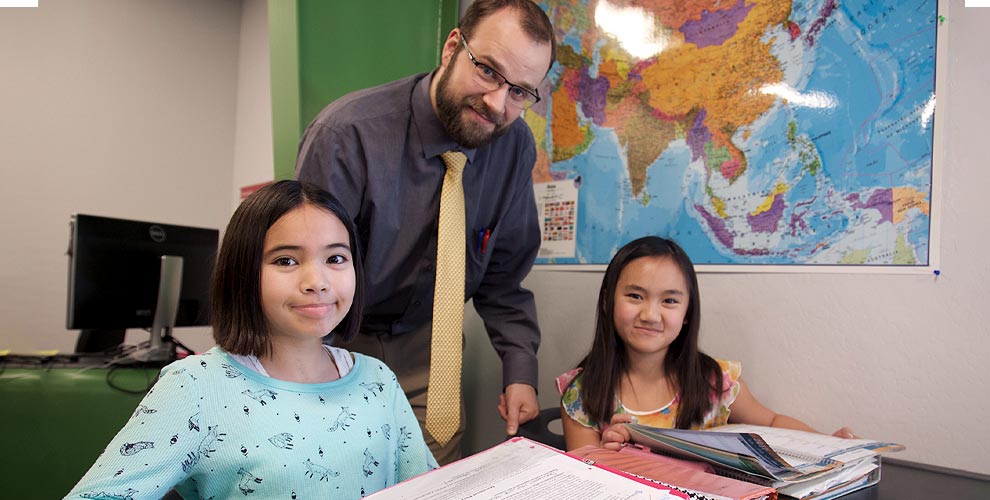You, as a parent, play a primary role in your children’s education. Multiple sources reveal that the active participation of parents in their children’s educational process helps them feel better about their schoolwork. But how can you get more involved in their education? We give you some tips to put into practice.

As a parent, you play a fundamental role in your children’s education. Multiple research shows that the active participation of parents in their children’s educational process leads to better grades, greater motivation, and better results in school, in general.
Despite this, many parents see this as a challenge and struggle to find ways to be actively involved in their children’s education. To give you some ideas, we share some tips so that you are increasingly present in this sense.
Stay in touch with your children’s teachers
Communication with your children’s teachers is key to understanding how they are doing in school. So be sure to attend parent-teacher conferences, and take advantage of those opportunities to talk with them throughout the school year.
Be sure to ask teachers, whenever you can, about your children’s strengths and opportunities for improvement so that you can work together to develop strategies to facilitate their academic success.
Also, keeping the lines of communication open is very important. If you can, ask the teachers for their email addresses so you can ask questions whenever you need it and have their support during your children’s educational process.
Create a special space to study
Designing a learning environment that is welcoming and that, precisely, invites you to study, is essential to foster your children’s motivation to learn.
Therefore, if possible, allocate a room in your house that is solely and exclusively used for school activities and studying. This helps ensure that, every time your children enter the room, they realize that their purpose at that moment is to learn.
In addition, it is important that this space is quiet and free of distractions to get the most out of it.
Also, make sure to spend quality time with your children while they study and do their homework. This gives them the security that they have someone who can help them solve problems that arise when studying.
Promote critical thinking
Critical thinking is an extremely important skill for academic success. Encourage your children to continually ask questions and think about the world around them.
To achieve this, you can discuss current events with them, or even invite them to research a topic and share their thoughts with you to challenge them to create their own opinions and express their ideas actively and creatively.
You will be amazed at what you and they can learn by putting this strategy into practice.
Attend school events and activities
Attending school events and activities is a great way to show your children that you value their education, as well as the other activities they do at school.
Make an effort to attend school presentations, sporting events, and other activities your children have at school. If you can, get involved in the school community, volunteering to organize events, or managing communication channels between parents and teachers.
Also, attending school events is a great way to meet other parents and stay informed about what’s happening at school.
Monitoring your children’s progress
Monitoring your children’s progress in school is essential. Talk regularly with them about how they feel about their schoolwork, what assignments and tests they have pending, and most importantly: how you can help them.
Also, review their grades and test results. But he remembers, that while grades are important, they’re not everything; What matters is what your children learn.
Likewise, if you identify that your children have difficulties in a particular subject, consider supporting them by hiring a tutor and finding a way to access resources that will facilitate their learning.
Foster a love of learning
Studying and learning doesn’t have to be tedious.
Encourage your children to explore their interests and passions through reading, writing, and other educational activities. You can even think of strategies to combine your children’s tastes with schoolwork.
Likewise, set aside time so that, in their free time, your children can clear their minds and do what they like. Encourage them to take risks and try new things so they can make the most of what they are passionate about.
By fostering a love of learning, you can help your children develop a lifelong passion for education.
Use technology to stay informed
Technology can be a great tool to stay informed about your children’s education. Many schools now offer online portals or apps that allow parents to track their children’s progress, communicate with teachers, and access important information about school events and activities.
Take advantage of these resources to stay informed and involved in your children’s education.
In conclusion, your participation as a parent is crucial to contributing to your children’s academic success. By following these seven tips, you can begin to play a much more active role in your children’s education and support their overall academic and personal development.
Remember, education is a cooperative process between parents, teachers, and schools, and the actions of each can make a significant difference in the educational process of any child.
